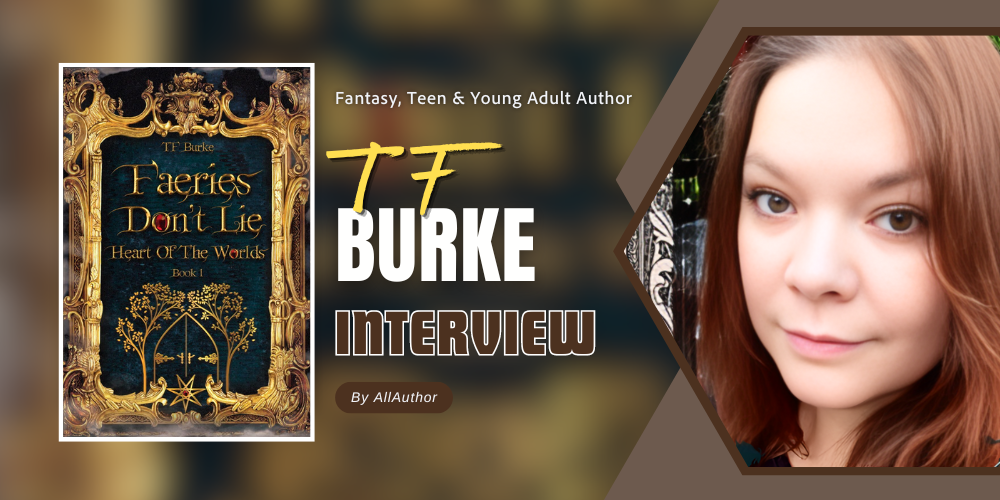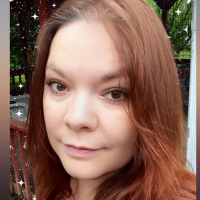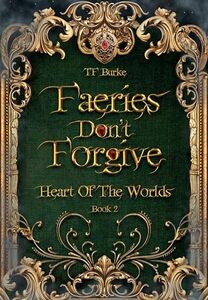TF Burke Interview Published on: 04, Oct 2024
 Can you tell us about your experience working with David Farland’s Apex-Writers? How has it influenced your writing and career?
Can you tell us about your experience working with David Farland’s Apex-Writers? How has it influenced your writing and career?
David Farland and his Apex-Writers have been a game-changer for me. So happy that I joined because I immediately felt like I met my people. And having David Farland as a teacher and mentor? Amazing! For those unaware... David Farland was a NY Times bestseller and a mentor to Brandon Sanderson, Brandon Mull, Stephanie Meyers, and others. He was often called a king-maker.
After his death, and it was a crushing blow to the community, the family asked me to come aboard to help out. Of course I said yes.
Working for Apex-Writers is amazing. I get to reach out to industry leaders like Jim Butcher, Michael Hauge, James Scott Bell, Lisa Cron, and Jonathan Maberry, and up-and-comings to invite them to present on one of our weekly zoom calls. I also get to invite agents and editors, etc. It's powerful and sometimes a little intimidating getting to interact with and learn from these individuals... and so worth it!
I get to host three of their weekly zoom calls: Strategy where we cover topics on how to best move forward in your authoring career; Mindcraft & Wings, a discussion group covering various topics under the authoring umbrella; and Midweekers, an accountability group which also provides brainstorming and celebrating successes. I also get to prepare and give presentations to this international writing community and provide content for social media posts, etc.
All in all, it's satisfying to pay it forward. See Dave was one of those people who made you feel like you could do anything and it's important to me to follow and walk that mindset.
As to my authoring career, Apex-Writers has certainly helped me with having a fairly wide resource pool with having people who I can turn to when needed. Being part of the community probably also helped with gaining a scholarship to Superstars Writing Seminar. That by the way is another amazing group. I particularly loved that I got to have a career consultation with Dune's Kevin J. Anderson, along with expanding my network of colleagues.
The last perk from working with Apex-Writers... gaining solid confidence in what I'm doing and the means to learn what I need to know.
So lastly, being part of a positive writing community is empowering and I highly recommend it. There's various ones out there. Apex-Writers is definitely a great one and if you'd like to check it out, go to Apex Writers Group Home - Apex Writers Group or check out my website for a special offer affiliate code.
What inspired you to start writing, and how did you transition from writing newspaper articles to publishing books?I've been writing since about the time that I could pick up a pencil... and before that I spun stories and told them to my dolls. As for writing newspaper articles, most of them were written during my time as a reporter for a daily newspaper. I thought being paid to write while learning how to write to a deadlines would be beneficial. And boy, did I learn to write to deadlines!
I enjoyed a lot of the work, interviewing especially. It was fun interviewing Kevin Clash, the voice of Sesame Street's Elmo and Babe Ruth's granddaughter, to name a couple.
The job did come with some downsides. The biggest one... after writing and submitting 2-4 stories daily, I did not have the creative bandwidth to work on fiction stories.
Your work spans various platforms and genres, including faery lore and fantasy. What draws you to these themes, and how do you keep your writing fresh and engaging?Fantasy is one of those areas where you can explore human complexities in a "safe" environment. Plus all the wonder! Almost as good as seeing a three-year-old's awestruck expression at seeing a firefly light up before them is exploring new and fantastical sights and concepts.
As for faery lore... I've always been intrigued by faeries. It's pretty amazing that about every culture in about every scrap of land have had their versions of faeries. Why is that? Probably explanations for the unknown, meaning they are born from sheer imagination... layered with cultural beliefs. It's fascinating.
Can you share a bit about the process of compiling and contributing to anthologies like "Murderbugs" and "Unhelpful Encyclopedia"?Actually that is the same anthology. The Unhelpful Encyclopedia will have several volumes. Murderbugs was the 2nd volume. Murderbirds was the first.
I do highly recommend submitting short stories into anthologies. For me, notice to submit for Murderbugs appeared in one of my Facebook groups. I thought why not. You look at what the anthology is looking for, write the story, give it an edit, maybe a betaread, etc. and submit. Please be sure if they're asking for a certain format to follow it. You don't want to give the editor a reason to automatically reject your story. And last, if you don't have a story accepted, and if you are submitting, you will run into this, please know that you can find a home for it later... either with another publication or maybe a reader magnet, for example.
Your first book in the Heart of the Worlds Series has been well received. What can readers expect from the next installment?Excited to get Faeries Don't Forgive out in February! In Faeries Don't Lie, readers got to see the adventures of Aunia, a 16 year old apothecary apprentice and village outcast, and Mathias, a 17 year old pegasus flyer. They both come with some heavy emotional baggage thanks to their families and they're both determined to be better than where they come from; however even with best intentions... they unleashed a lot of danger into their worlds.
So in Book 2, these two have left Aunia's isolated village. They've journeyed into Tamore, a sprawling kingdom and home of the pegasi flyers.... with rumors that the ruling queen is mad. Some of the mysteries left unanswered like the Blood Ball, Mathias' mentor's death, exactly who Aunia's father really is will be explored. And Aunia is going to learn that wanting answers and being ready to hear them are certainly not the same.
How do you balance your time between writing, marketing, and your administrative duties at Apex-Writers?I have a faery in my pocket that replays time for me. That would be amazingly cool, wouldn't it? But seriously, we all have 1440 minutes in every day. Knowing how to pivot is important but perhaps best is knowing there is NO way you can get everything done in one day. But if you do a little everyday or at least frequently, things will come together.
Also important is knowing when to take needed breaks... sooner than later. Taking little breaks and unwinding frequently is far better than experiencing burn-out because you insisted on muscling through for far too long.
Medieval-style fencing seems like a unique and intriguing hobby. How did you get involved in it, and does it influence your writing in any way?Medieval-style fencing is amazing! I discovered it back in November 2010. This is through the Society of Creative Anachronism where I get to go to practice, participate in tournaments and melees, aka battles ranging from two to several hundred on a side. It's co-ed, meaning I fence with the guys, not just the ladies. I also was very happy that I got put in a field command position for a small unit during one of the big fencing battles.
Has fencing influenced my writing? Incredibly so. There is more correlation to sword and pen than I would have thought. One of the biggest ones is the ability to get into flow state and knowing to trust my subconscious. It's also helped me with my self-confidence level, my philosophy of having wins or learning opportunities, and better fight scenes on the page... particularly sword battles.
What challenges do you face when writing fantasy, and how do you overcome them?I find fantasy actually easier to write than other genres. I can let my imagination run wild and play a lot of "What-if" games. Now saying that, yes you have to make up the worlds complete with civilizations, politics, trade, history; the people, flora/fauna, etc. and fantasy, which can be a pretty tall order. And in my humble opinion, having a foundation of truth under the made-up stuff makes the new world resonate more. I've done stuff like research aerial currents around mountains for my pegasi and their flyers, and I've researched farm crops and time frames for Aunia's village. I've even wrote a history book of sorts so these worlds feel like they've always been there. It's a lot yes, but maybe it doesn't seem hard because I enjoy it.
Can you describe your approach to world-building, especially in the Heart of the Worlds Series?To piggy-back on part of the earlier question. The world-build started with me just having a loose idea and playing "What-If." What if there's a mad queen who rules in a castle in the clouds. Well... how did the castle get up there? That question by the way created an entire origin mythos. Why and how did she become mad? Another swatch of worldbuild history. What sort of things are around her? What does this continent look like? How does the queen and her country get along with the neighboring countries? They don't? Well, why is that? Oh, there was that falling out. Why? What caused it? And as I create backstory, I look for connections with all these threads until the webbing formed and ... well, I got my own version of JRR Tolkien's Silmarillion.
Anyway, I created enough content from why's and what-ifs until my protagonist showed up... in Aunia's case, fully-formed, and I started writing her story. I still do have to pause occasionally and go into research mode. And then I have to force myself out of some rabbit hole, because I need to get back to writing.
You host and participate in many writer-focused Zoom calls. What common advice or tips do you find yourself sharing with aspiring writers?Acknowledge and celebrate your wins no matter how small, because our big wins are built on the mountain of all our smaller accomplishments.
Here's another that I wish I remembered who first coined it... You've a reader out there with a hole in their soul the size and shape of your story. They need you to persevere and get it into the world. It's important.
Writers write.
And last. If you ever hear a voice in your head telling you to give up...that your work isn't very good... that you'll never make it... That's called a brain weasel. We all get them and that means you are in very good company. However, you need to point at that brain weasel, tell it it can't talk to you that way, and kick it to the curb. You can do anything you put your mind to. You might need to learn how to do the thing. You might need more practice. But you are capable of everything.
How do you stay organized and productive with such a busy schedule? Do you have any specific tools or techniques that you find helpful?The first thing is identifying priorities... What can you let slide and what must be done sooner than later or even NOW. And also try to carve out a little time each day to work on the important but without a firm deadline tasks. Even if it's only 10 minutes a day... it adds up.
Tools that have helped me to stay organized:
Goodnotes. I have my planning calendar here and I jot down my high-priority tasks and appointments. I can also write out my ongoing tasks and projects, break things into pieces and schedule those... but, and this is something I really like... I can easily cut & paste items from one day to the next instead of having to rewrite them. And there are stickers, so it's almost like having a little bit of playtime. Mary Poppins says a spoonful of sugar helps the medicine go down. I say if you can sprinkle a little bit of play in... work doesn't seem like work.
Notion. I rely heavily on this online note-taking app. It works great as a second brain. You can create databases, Kanban boards, wikis, calendars, timelines. I have my story bible, my plotting outline, my launch schedules, Apex-Writers schedules and contacts, and anything I need to keep track of on here. It's easy to attach links to this app. Drop in PDFs, pics, etc. I will warn, there's a bit of a learning curve to it but, in my humble opinion, extremely well-worth it.
Canva. This app lets me make appealing graphics for Apex-Writers and graphics and reels for my authoring life. I can put my post/caption under the Notes part of each Canva pic or reel for easy accessibility, and when I'm ready, I can easily upload the reel to my different social media accounts with my post/caption and schedule them. So yes, I generally have a post up everyday; however, that doesn't mean I'm doing that task everyday.
Finch. This little app on my phone helps me to gamify my day and that's great for keeping me motivated and focused. It's a silly little game with a cute digital pet who tells you positive things and you collect rainbow stones when you cross things off your to-do list. You can buy cute little outfits and room decorations for your little finchie bird and there's cute little adventures you can go on and gain loot as well.
What role did research play while writing “Faeries Don't Forgive”, especially when dealing with faery lore and medieval settings?The role is an important process intertwined with a spiraling rabbit hole which I can get lost in. I love to research... especially when it comes to faery lore and history. I find research is very important; however, you have to be careful to not let it come between you and your writing. And also it's perfectly accepted...wanted even... to take what you've learned and/or know and to put your own spin on it.... create something new.
What has been the most rewarding part of your writing career so far?This is a hard question. I find reward in the work itself. I mean, I get to create whole universes! How cool is that? I get to play in a writerly community with other creatives...people who get me when I jabber on about my projects and people who I enjoy listening to when they tell me theirs. I get to watch the sparkle in someone's eyes when they realize that yes, they can reach for their dreams. And I've been thrilled to be told by some readers that I made them stay up all night because they couldn't put my book down. So most rewarding...I suppose the most rewarding part of my writing career is being in my writing career.
What future projects are you excited about, and what can readers look forward to next from you?First up, Heart of the Worlds series. There's seven books, each coming out about 9 months apart. Faeries Don't Forgive launches in February. And then Faeries Don't Hide comes out in November 2025. After I finish this series, I'm looking forward to playing around with a steampunk middle grade story with a 12 year old inventor and her little brother who take on a shadowbeast with the help of pixies and a hand-sized dragon automaton. And, I'll probably get some more short stories out in the world as well.
When did you join AllAuthor? What has your experience been like?I joined AllAuthor shortly after Faeries Don't Lie launched in May this year. After reaching Amazon's top free 100 ebooks on the second day of the launch, I wanted to keep momentum going by letting readers know that my book and I are here. I mean, you can't read a book if you don't know it exists, right?
AllAuthor has helped me with increasing my following on X and readers have followed me here on AllAuthor too. The tools like book mock-ups, the GIF maker and the scheduler are great! Plus, I've definitely enjoyed having the opportunity to do this interview with you. So all in all... a great experience!
TF Burke is an accomplished writer and marketing specialist currently working with NYT Bestseller David Farland’s Apex-Writers, where she coordinates industry leaders for weekly multi-Zoom calls and hosts writer-focused sessions. When she’s not immersed in writing or exploring faery lore, TF enjoys medieval-style fencing tournaments and melees, wielding a sword and dagger since 2010.



